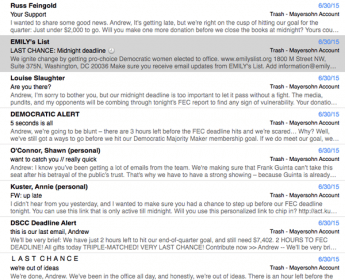Last week was one of the most tense in 2015’s political calendar—and not only because of the Supreme Court. June 30th was the last day covered by the Federal Election Commission’s mid-year reporting period, which meant that campaigns were frantic to raise money before the deadline so they could impress potential elite backers.
Anyone who is subscribed to a candidate’s email list, though, probably knew this already. Their inboxes were full of near-hysterical subject lines, promises to “triple-match” donations, and candidates trying to mimic the style of casual emails from friends. The bolder political groups cross over into outright scam territory, using subject lines designed to make readers think that their house is about to be repossessed. (This parody site only slightly exaggerates the tone of emails from the Democratic Congressional Campaign Committee, an especially flagrant offender.)
Raising money is still the first and most vital task of a campaign, so the hysteria conveyed by these emails is based on real desperation. Fundraising numbers are a hugely important metric by which parties and other outside actors gauge which candidates are competitive enough to deserve support.
Mobilizing people to participate in politics often involves getting on their nerves, as any canvasser or campaign phone-banker can attest. Still, the combination of dishonesty and aggressive attention-seeking in these emails is remarkable. Even the average attack ad is more substantive and less misleading. So why do campaigns risk irritating their supporters this way? Because it works. Those subject lines are typically the result of several rounds of A/B testing and optimization; only the versions that drive lots of clicks and donations get sent to the entire email list. More than a decade into the era of online politics, campaigners have a pretty good idea what draws attention—and hyperbole, manufactured urgency, and fear are safe bets. The only constraint on the hysterics is the “unsubscribe rate” that emails produce, another metric that campaigns track.
The hysteria conveyed by these emails is based on real desperation—fundraising numbers are a hugely important metric to campaigns.
What works for an individual politician or group, though, doesn’t necessarily work for democracy as a whole, because political engagement has a Tragedy of the Commons problem. Even engaged citizens—the kind who ends up on political email lists—have a limited supply of attention they are willing to devote to politics, and limited goodwill and trust in the political process. This stock is easy to deplete but difficult to replenish, so each campaign has an incentive to fight like crazy for its share of attention. Even groups that are nominally on the same team, like Democratic candidates or environmental organizations, are still in competition, because they are fighting over an even smaller subset of engaged citizens that share their area of focus (e.g. liberal campaign donors or environmentalists).
The result is a free-for-all that ultimately serves no one’s interest. The net effect of the fundraising noise machine is to disempower and dishearten. Crying wolf about the Koch brothers only works so many times. Moreover, all the emails about money give the impression that cash is all that matters in politics, which doesn’t exactly encourage participation. (This is speculation; as far as I know nobody has studied the long-term effects of fundraising tactics on political engagement. But I dare you to read through dozens of nearly identical, substance-free end-of-quarter email appeals without feeling like tuning out politics entirely.)
The decades-long decline in American political participation predates the World Wide Web, let alone mass email fundraising, but perhaps these tactics help explain why recent strides in targeting and campaign technology haven’t done much to boost voter turnout. When a group improves its email testing or comes up with a killer subject line, the main effect is to increase its share of engaged-citizen attention at the expense of other groups, like an oil driller buying a better rig to deplete a field before his competitors can get to it. For the same reason, we shouldn’t expect too much from new technologies and platforms—like Brigade, the just-launched social network for politics, or the live-streaming app Meerkat—that promise to change the way people participate. Ultimately, most of these will appeal only to those who are already politically active, competing for their attention with Facebook, Twitter, and traditional media. As I’ve argued before, few campaigns or organizations appear to be adopting the “technologies” that do create engaged citizens: mass person-to-person contact and relational organizing.
In a sense, this is the culmination of a half-century-old trend in activism that Theda Skocpol described as the transition “from membership to management.” The organizations that used to mobilize large numbers of Americans—unions, churches, fraternal societies—also relied on them for manpower and decision-making, while the new wave of activist groups that sprang up after the 1960s need “members” primarily to fund the activities of a small, professional staff. Modern campaigns are the ultimate expression of this trend, since they raise money primarily to bankroll huge media buys and don’t need the same kind of sustained relationship with their email lists that a union or church has with its members. The advent of super PACs, which don’t even have constituents to worry about, has added another degree of separation. Super PACs often supply the abrasive attack ads that candidates don’t want to run themselves for fear of tarnishing their own image; in my observation, super PACs are even more aggressively obnoxious fundraisers than campaigns, likely for the same reason.
Of course, annoying emails are very small in the scheme of problems in American politics. Only a small slice of the public will even end up on a campaign list, given the tiny fraction of the population that will ever make a sizeable donation or voluntarily sign up on a campaign’s website. As long as politics remains a niche interest, though, the way that segment of the population interacts with the political world matters. Sending them such cynical and discouraging messages can’t be healthy for democracy.








